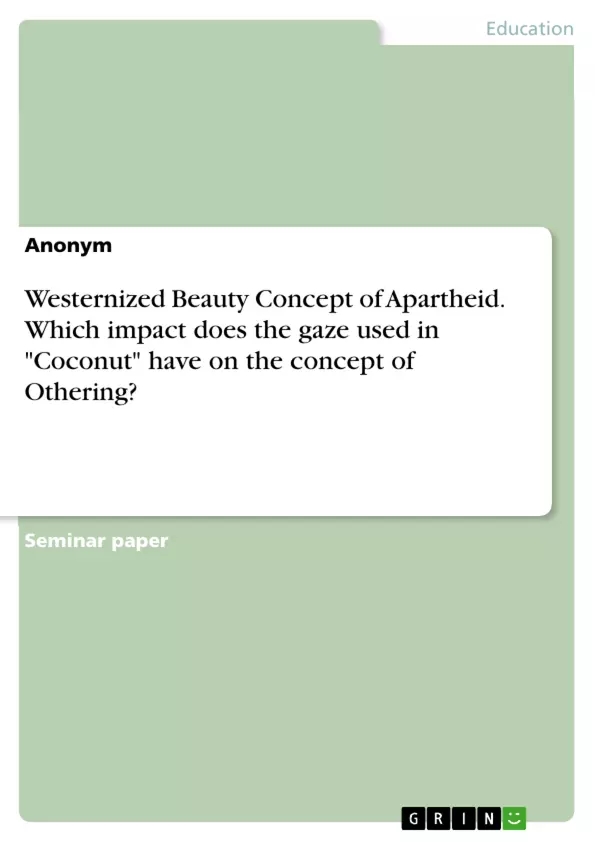Which impact does the gaze used in "Coconut" have on the concept of Othering and in particular on the westernized beauty concept of black women after Apartheid?
Kopano Matlwa's novel "Coconut" which was firstly published in 2007 is about two black girls, Fikile and Ofilwe, who want to be “white, rich and happy”. Both girls struggle to find their own identity since they are stuck between two worlds, namely the South African and the Western one which have an impact on the perception of the two main characters. The novel is divided into two parts. The first half of the book is narrated by Ofilwe and the second half by Fikile. Both girls live in Johannesburg. Although their lives seem to be completely different, they have one important aspect in common. In contrast to Ofilwe, Fikile is poor and lives with her abusive uncle in a township. Ofilwe lives with her wealthy family in a suburb. The only place where they meet is the restaurant Silver Spoon - Fikile's workplace. Ofilwe and her family have “the same Silver Spoon's Traditional English Breakfast every Sunday” and since Fikile works there, both girls know each other. In brief, the summary of this novel is the black female's struggle to find her identity in post-Apartheid. It is difficult for these women and young girls to know their identity as they are influenced by the western culture and its beauty standard. Furthermore, not only does the western influence play an important role in Coconut, so does gaze. According to the Oxford Dictionary, gaze is either a “steady intent look” or in literary theory, “a particular perspective considered as embodying certain aspects of the relationship between observer and observed”. In this paper, the second definition of gaze is relevant. The concept of gaze is divided into three observer perspectives. With respect to black females, the first perspective is the one of white people looking at black women.
Inhaltsverzeichnis (Table of Contents)
- Introduction
- Body
- Media's impact on the self-concept of black females
- Black females associate wealth with a white skin color only
- Being white offers more advantages than being black and rich does
- Black females refuse to accept black women in their circle of friends
- Westernized black women are othering non-westernized Blacks
- Black and white men seek westernized beauty in searching for a partner
- The eternalized Other as a current subject in post-Apartheid
- Conclusion
- Works Cited
- Declaration
Zielsetzung und Themenschwerpunkte (Objectives and Key Themes)
This paper examines the impact of the gaze, particularly the Westernized beauty concept of black women after Apartheid, as depicted in Kopano Matlwa's novel "Coconut". The paper explores how the novel's main characters, Ofilwe and Fikile, struggle with their identity and are influenced by Western beauty standards. The paper argues that the gaze in "Coconut" reflects the concept of Othering and the consequences of Apartheid on the self-perception of black women.
- The impact of Western beauty standards on black women's self-concept
- The influence of media and its portrayal of beauty ideals on black women
- The role of gaze in shaping perceptions of black women in post-Apartheid South Africa
- The concept of Othering and its relevance to the experiences of black women
- The interconnectedness of race, beauty, and identity in the context of Apartheid
Zusammenfassung der Kapitel (Chapter Summaries)
The first part of the paper examines the impact of Western media on the self-concept of black women. It highlights how the media's focus on white beauty standards can lead to feelings of inadequacy and dissatisfaction among black women. The paper explores the ways in which black women internalize these standards and modify their appearance to conform to them. The paper then moves on to discuss the concept of Othering and how it relates to the experiences of black women in post-Apartheid South Africa. It argues that the gaze, both internal and external, perpetuates the Othering of black women, contributing to their marginalization and exclusion.
Schlüsselwörter (Keywords)
The main keywords and focus topics of the text include: Western beauty standards, media influence, self-concept, black women, Apartheid, Othering, gaze, identity, post-Apartheid South Africa, and "Coconut" by Kopano Matlwa.
- Arbeit zitieren
- Anonym (Autor:in), 2016, Westernized Beauty Concept of Apartheid. Which impact does the gaze used in "Coconut" have on the concept of Othering?, München, GRIN Verlag, https://www.hausarbeiten.de/document/537474


